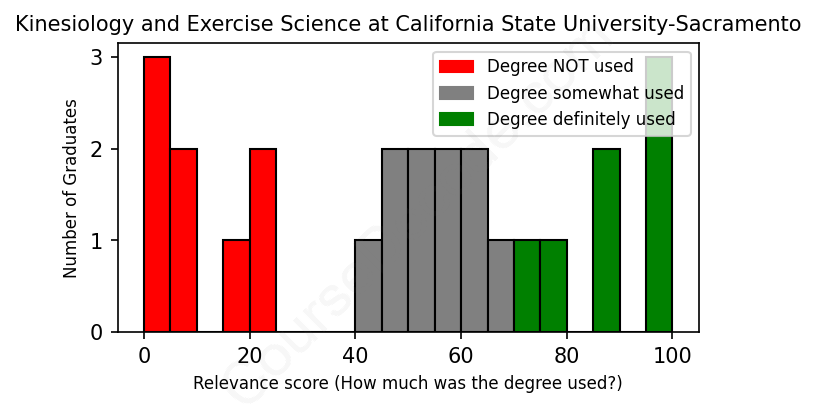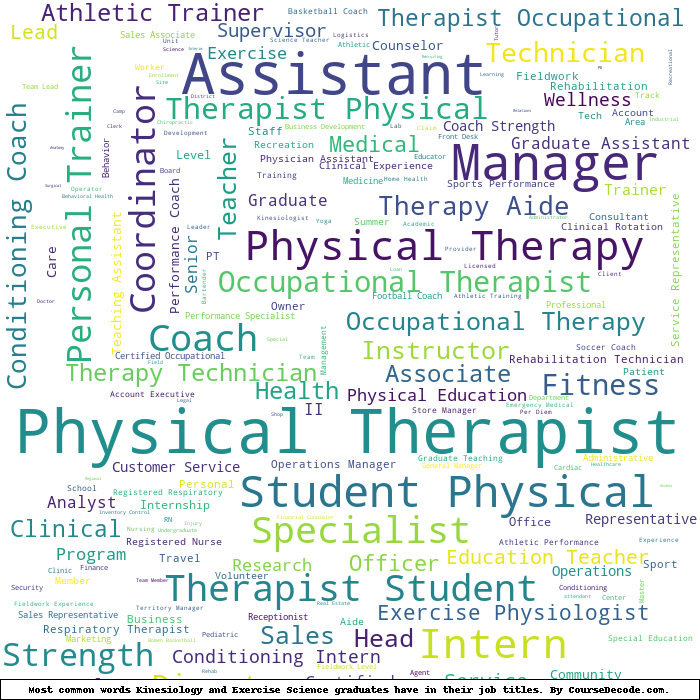
First, some facts. Of the Kinesiology and Exercise Science graduates from California State University-Sacramento we've analyzed , here's how many have used (or NOT used) their degree in their career:

These are estimates based on AI analysis of 25 LinkedIn profiles (see below).
The verdict? Significantly below average. Overall, with an average relevance score of 49%, Kinesiology and Exercise Science graduates from California State University-Sacramento have a much lower likelihood (-18%) of finding work in this field compared to the average graduate across all fields:
And for comparison, here's the chart for all profiles we've looked at across all degrees.
Also, after graduating, only 32% of these graduates have pursued further education other than another Bachelor's degree (such as a Masters degree or other), compared to the average across all profiles of 35%. This suggests a Bachelors degree is enough for most Kinesiology and Exercise Science graduates, and it's normal to look for work straight after graduation.
See the details:
|
Relevance score: 62% We think this person has gone into a career only somewhat relevant to their degree. We think this person has gone into a career only somewhat relevant to their degree.
DEGREE INFOGraduated in 2014 from California State University-Sacramento with a Bachelor of Science (BS) in Kinesiology and Exercise Science. No other secondary education since. JOB HISTORY SINCE GRADUATIONEmployee Scientopia May 2014 - Feb 2016 Yoga Laughter Teacher  Self Employed May 2014 - Apr 2017 ABOUTCurrently looking to get into a Physical Therapy Program! |
The top 10 most common jobs done by the graduates we've analyzed (ranked most common to least) are:
When looking at the career paths of people who graduated with a degree in Kinesiology and Exercise Science from California State University-Sacramento, a variety of job roles emerge. The most common types of jobs tend to include positions as physical therapy aides, personal trainers, and roles within fitness coaching, which directly leverage their knowledge of human movement and rehabilitation. For instance, many graduates found themselves working as physical therapist aides, where they actively apply their understanding of kinesiology principles to assist with patient care. Jobs like personal trainer and fitness director also allow graduates to create fitness programs based on exercise physiology, making them very relevant to what they studied.
However, there's a noticeable trend where many graduates end up in roles that are not deeply connected to their field of study. Positions such as administrative assistants, sales coordinators, and even software engineers dominate the landscape, suggesting that a Kinesiology and Exercise Science degree doesn't always lead to a job specifically within that area. Some roles do require a base level of understanding in health and wellness (like working as a brand ambassador for health products), but many others have little to no relevance to Kinesiology principles at all. In summary, while a significant portion of graduates land jobs directly linked to their degree, many others find themselves in unrelated fields, highlighting the mixed outcomes in terms of employment relevance for Kinesiology and Exercise Science graduates from Sacramento State University.
Here is a visual representation of the most common words in job titles for Kinesiology and Exercise Science graduates (this is across all Kinesiology and Exercise Science graduates we've analyzed, not just those who went to California State University-Sacramento):

When looking at the career paths of graduates from California State University-Sacramento with degrees in Kinesiology and Exercise Science, it's clear that their initial jobs often vary quite a bit. A few folks landed straight into health and wellness roles, like massage therapists and physical therapy aides. Others, however, veered into seemingly unrelated fields early on, taking up positions like ramp agents or even software engineers. Over time, though, there seems to be a trend toward more aligned careers as many graduates return to the health and fitness sectors after gaining life experience or refining their interests—like transitioning from sales and admin jobs into roles such as personal trainers and occupational therapists after a few years. This suggests that while some may start off in random jobs, they often find their way back to their roots in Kinesiology and Exercise Science.
Fast forward five to ten years after graduation, many graduates have established themselves within the health and fitness communities. Roles such as physical therapists, fitness directors, and behavior therapists are more common, pointing to a maturation of their career paths toward jobs that align with their degree. While some did stray into different fields—like business development or administrative roles—others have found rewarding careers in health settings, indicating that there is a decent rate of success among these graduates in securing careers relevant to their studies. However, it’s worth noting that some graduates have taken more circuitous routes that lead them further away from their initial focus, showing a mixed bag of outcomes that highlight the importance of finding what truly resonates with them in their careers. Overall, the journey seems rich with possibilities, but not all paths lead directly back to Kinesiology and Exercise Science-related positions.
Getting a Bachelor’s degree in Kinesiology and Exercise Science at California State University-Sacramento is generally considered to be on the moderate side in terms of difficulty. You’ll definitely be challenged with some of the science courses, like biology and anatomy, which can be pretty intense if you’re not super into that stuff. But overall, if you have a passion for fitness and are willing to put in the work, it tends to balance out. Lots of people find the practical aspects, like labs and hands-on activities, really engaging, so that can make the studying feel a bit easier. Just be prepared to manage your time well and stay on top of your assignments, and you should be alright!
Most commonly, in the LinkedIn profiles we've looked at, it takes people 4 years to finish a Bachelor degree in Kinesiology and Exercise Science.
Looking at the career paths of these Kinesiology and Exercise Science graduates from California State University-Sacramento, it seems like their earnings vary quite a bit. Some have landed solid positions, like those working as software engineers or in roles with companies like Intel and the Judicial Council of California—these guys are likely pulling in decent salaries. But then you have others in entry-level or part-time gigs, like physical therapy aides and retail positions, which probably aren’t paying a whole lot. Overall, I’d say it’s a mixed bag; while some are making good money and moving up, others are still kind of in the grind, earning a bit less. So, if you're aiming for a high paycheck, keep an eye on what fields you want to jump into after college!
Here is a visual representation of the most common words seen in the "about" section of LinkedIn profiles who have a Bachelor degree in Kinesiology and Exercise Science (this is across all Kinesiology and Exercise Science graduates we've analyzed, not just those who went to California State University-Sacramento). This may or may not be useful:

Here are all colleges offering a Bachelor degree in Kinesiology and Exercise Science (ordered by the average relevance score of their Kinesiology and Exercise Science graduates, best to worst) where we have analyzed at least 10 of their graduates: